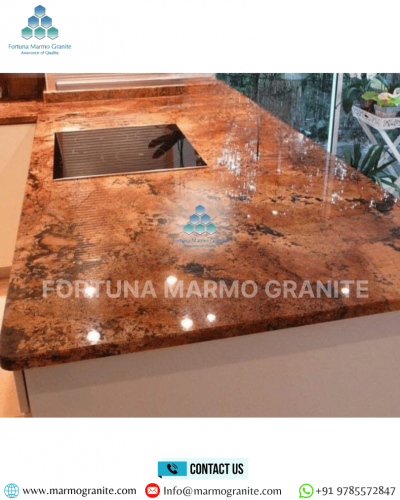"Quartz vs. Granite: Which is the Best Kitchen Countertop?"
Quartz vs Granite Choosing the best kitchen countertop often leaves homeowners debating between two of the most popular and trusted materials: quartz and granite. Both materials combine beauty, durability, and functionality, making them top choices for kitchen makeovers. Each option, however, brings unique advantages and a few drawbacks, which can make the decision challenging. In this blog, we'll explore a detailed comparison of quartz and granite countertops to help you understand their key differences and decide which one best suits your kitchen.
1.What is Quartz?
Quartz countertops are engineered surfaces made from natural quartz crystals, combined with resins, polymers, and pigments. The process involves mixing ground-up quartz stone with these binders and pressing the mixture into slabs. The result is a non-porous, durable surface with the aesthetic appeal of natural stone, but without some of the maintenance requirements. Quartz countertops can be made in a wide variety of colors, patterns, and finishes, allowing homeowners to choose from a wide selection to suit their kitchen design.
2.What is Granite?
Granite is a natural stone that is formed from crystallized magma deep beneath the Earth's surface. This igneous rock is extracted in large slabs, cut into countertop-sized pieces, and polished to reveal its stunning patterns. Each granite slab is unique, making it a popular choice for homeowners who appreciate the one-of-a-kind aesthetic of natural stone. Granite is available in various colors and patterns, ranging from subtle earth tones to vibrant hues, giving homeowners plenty of options to choose from.
3. Durability
Quartz:
One of the main reasons why quartz countertops are so popular is their durability. Since quartz is an engineered stone, it is more uniform in composition compared to natural stones like granite. Quartz countertops are non-porous, meaning they don't absorb liquids, preventing the growth of bacteria, mold, or mildew. This makes quartz a hygienic option, especially in high-use areas like the kitchen. Quartz is highly resistant to scratching and chipping, though it's not completely immune. It can withstand high levels of heat, but direct contact with hot pots and pans should still be avoided to prevent potential damage.
Granite:
Granite is a tough and durable natural stone, known for its ability to resist scratches and heat. The stone is highly resistant to heat, making it perfect for use around stoves and ovens, as hot cookware can be placed on granite without damaging it. Granite is also incredibly strong, making it a solid choice for areas with high activity.
However, granite is porous, meaning it can absorb liquids and stains if not sealed properly. While granite is generally resistant to most stains, if liquids are left on the surface for a prolonged period, they may cause discoloration or stains.
4. Maintenance
Quartz:
Quartz is one of the easiest materials to maintain when it comes to kitchen countertops. Thanks to its non-porous nature, quartz does not require sealing, unlike granite. This makes quartz a more convenient and low-maintenance option for homeowners. To clean quartz, all you need is a damp cloth or a mild cleaning solution to wipe away any mess. It doesn't need frequent re-sealing or maintenance to maintain its luster.
Granite:
Granite countertops require more maintenance compared to quartz. Since granite is porous, it needs to be sealed upon installation and resealed periodically (usually every 1-2 years, depending on usage). Regular sealing prevents stains and bacteria from penetrating the stone. Additionally, while granite is relatively easy to clean, acidic substances such as vinegar or lemon juice can damage the surface, so it's important to avoid using harsh cleaners.
5. Aesthetic Appeal
Quartz:
Quartz offers a more consistent appearance compared to granite. Since it is an engineered material, manufacturers can control the pattern and color of the quartz, offering an extensive range of design options. Whether you prefer solid colors, veining, or patterns that mimic natural stone, quartz can be customized to suit any kitchen style. Quartz is also available in a variety of finishes, including polished, honed, or textured, to achieve the desired look.
Granite:
Granite's beauty lies in its natural variation. Each slab of granite is unique, showcasing different patterns, colors, and textures. From the rich speckles of black, gold, or green, to the swirls of white and beige, granite provides a distinctive aesthetic that's impossible to replicate. Granite offers a unique look unmatched by quartz. . Granite's variation may not suit those desiring a uniform look, so quartz is a better option.
6. Cost
Quartz:
Quartz countertops tend to be more affordable than granite. The price of quartz typically depends on factors such as brand, design, and thickness, but it's generally more budget-friendly than granite. While quartz is not the cheapest countertop material on the market, it offers great value considering its low maintenance and durability. Quartz offers beauty and functionality without the high cost of granite.
Granite:
Granite countertops are usually more expensive than quartz. The cost of granite varies depending on the quality of the stone, the rarity of the color, and the region it's sourced from. High-end, rare granite slabs can cost a premium price, making it an investment for homeowners looking for natural stone aesthetics. Additionally, granite installation costs can be higher due to the complexity of working with natural stone.
7. Environmental Impact
Quartz:
Quartz countertops are often viewed as a more eco-friendly option than granite since they use abundant natural materials like quartz, resin, and pigments. Some resins and adhesives in the manufacturing process, however, may include chemicals that can harm the environment. To address this, many manufacturers now produce eco-friendly quartz made from recycled materials, helping reduce overall environmental impact.
Granite:
Granite is a natural stone, so it doesn't require the same amount of processing as quartz, making it a more sustainable option in some cases. However, granite mining can have a significant environmental impact, particularly if the stone is sourced from regions with less eco-conscious mining practices. Additionally, the transportation of granite from distant countries can contribute to a higher carbon footprint.
Conclusion: Which is the Best Option?
Quartz vs Granite Countertops both quartz and granite countertops offer unique benefits, making them excellent choices for any kitchen. Granite provides natural beauty and individuality, while quartz offers low maintenance, durability, and a wide range of styles at a more affordable price. Quartz vs Granite Countertops, Ultimately, the right choice for your kitchen depends on your budget, desired aesthetic, and maintenance preferences. At Fortuna Marmo Granite, we offer a variety of Quartz vs Granite Countertops options to help you create the perfect kitchen space tailored to your needs. Reach out to us today to explore our extensive collection and find the countertop that best suits your home.



